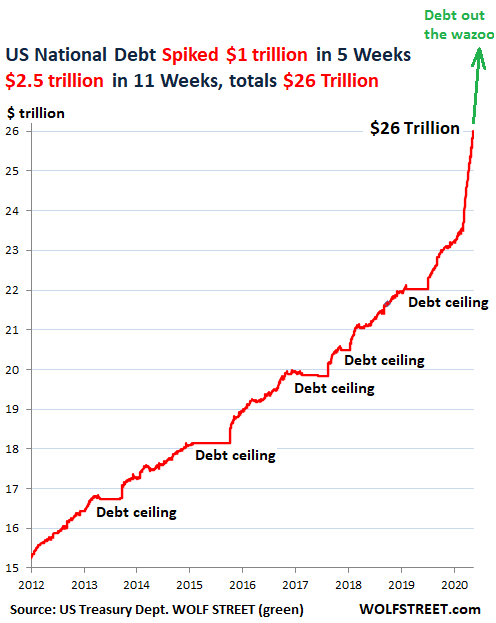-
 Janus
18kI agree that some of the worst ecological disasters occur in poorer countries. But I am looking at the global situation and this sidesteps the points that plenty of ecological disasters are happening in the richer countries, and that the use of chemical fertilizers destroys the microorganisms in soils, which then can only be replaced slowly over many years by mulching.
Janus
18kI agree that some of the worst ecological disasters occur in poorer countries. But I am looking at the global situation and this sidesteps the points that plenty of ecological disasters are happening in the richer countries, and that the use of chemical fertilizers destroys the microorganisms in soils, which then can only be replaced slowly over many years by mulching. -
 ssu
9.8k
ssu
9.8k
Yes, you can see the change in the attitudes in the use of chemical fertilizers from from the 1950's and 1960's as then what was overlooked was the impact the use has in the greater system, as fertilizers then would be transferred from the fields to small streams and rivers finally to the ocean, which would have huge impacts on maritime ecology. Basically I see one of the biggest problems was turning from crop rotation (and having fields in fallow) to single crop year-to-year agriculture and with heavy use of fertilizer. This kind of simplistic input-output thinking is one cause.plenty of ecological disasters are happening in the richer countries, and that the use of chemical fertilizers destroys the microorganisms in soils, which then can only be replaced slowly over many years by mulching. — Janus
Yet at least in the wealthier countries these issues can be solved. The emergence of local and organic food markets and organic food in general show that the wants of the buyers do mold the supply and if the political establishment does something about the environmental issues, changes can happen.
But back to the subject, the main question is if we can feed a population of +10 billion without totally devastating the environment. Famines have gone down and become more rare, which is very promising, yet we have to remember just how rapid has this transformation been. My country suffered it's last great famine only 152 years ago, which killed many times more people than WW2 or the civil war and was one of the last major famines in Europe. 150 years is still a short time in human history.
(Food distribution during the great famine of 1866-1868 in Finland. Note that the people and the children have arrived to the event in their best sunday clothes. About 150 000, perhaps 200 000, died then which was roughly 10% of the population. Now the problem is obesity.)

-
 ssu
9.8kIf people are interested in this subject...in the Lancet new forecast were published of the population peaking at 2064:
ssu
9.8kIf people are interested in this subject...in the Lancet new forecast were published of the population peaking at 2064:
See article: World's population likely to shrink after 50 yearsThe world's population is likely to peak at 9.7 billion in 2064, and then decline to about 8.8 billion by the end of the century, as women get better access to education and contraception, a new study has found.
By 2100, 183 of 195 countries will not have fertility rates required to maintain the current population, with a projected 2.1 births per woman, researchers from the Institute for Health Metrics and Evaluation at the University of Washington's School of Medicine said. Some 23 countries -- including Japan, Thailand, Italy, and Spain -- will see populations shrink by more than 50%, researchers said. However, the population of sub-Saharan Africa could triple, allowing for just under half of the world's population to be African by the end of the century.
So peak population? That surely will be a problem for perpetual growth.
The actual scientific Lancet article here: Fertility, mortality, migration, and population scenarios for 195 countries and territories from 2017 to 2100: a forecasting analysis for the Global Burden of Disease Study -
 Janus
18kThanks I'll have a read of it. Interesting that you say peak population will be a problem for perpetual growth. It seems to me that real growth is already ended, and that what may appear as growth is an apparition created by the generation of ever more credit.
Janus
18kThanks I'll have a read of it. Interesting that you say peak population will be a problem for perpetual growth. It seems to me that real growth is already ended, and that what may appear as growth is an apparition created by the generation of ever more credit.
I foresee a drastic reduction of global population coming long before 2064, which will be driven by energy and resource shortages, water depletion and soil degradation, novel viral and bacterial infections, wars and global warming. I don't believe over-population is a problem we have either the collective will or resources to solve.
I have no faith that the resources are there to enable us to lift enough people out of poverty and educate them so they will have few enough children to allow the population to decline quickly enough to avoid the drastic reduction of human population which I think will be brought about by the forces I mentioned above.
If only we could be willing to give up "business as usual" and be happy to live much simpler lives! We cannot even muster the collective will to resist the elites who are screwing us all; the problem is that too many of us are too comfortable to care enough. -
 Michael
16.8kFertility rate: 'Jaw-dropping' global crash in children being born
Michael
16.8kFertility rate: 'Jaw-dropping' global crash in children being born
The world is ill-prepared for the global crash in children being born which is set to have a "jaw-dropping" impact on societies, say researchers.
Falling fertility rates mean nearly every country could have shrinking populations by the end of the century.
And 23 nations - including Spain and Japan - are expected to see their populations halve by 2100. -
 ssu
9.8k
ssu
9.8k
Remember that population growth is the natural reason for economic growth.Interesting that you say peak population will be a problem for perpetual growth. It seems to me that real growth is already ended, and that what may appear as growth is an apparition created by the generation of ever more credit. — Janus
Just think about it: You start a family and you would get four children who themselves would start a family and get four children. That means thanks to you and your partner, there 20 people who work, who will buy a home who go and buy stuff daily.
This is also one of the reasons why demographic forecasts are actually quite accurate: for a couple of decades into the future the population who can have children already exists, hence the estimations for the next 50 years or so are quite accurate. After that, then they are just estimations as things can change.
That article shows where the real problem will be: Africa. If Nigeria will have nearly 800 million people, you surely want to get the Nigerian economy to mimick the growth of the Chinese or the Indian economy. Otherwise, things are going to be bad. -
 Janus
18kRemember that population growth is the natural reason for economic growth. — ssu
Janus
18kRemember that population growth is the natural reason for economic growth. — ssu
I think economic growth is also the driver for population growth. Back in the John Howard days here in Australia, there was a Government TV add campaign urging couples to have three children: one for mum, one for dad and one for the country, because they foresaw that if lifespans increase and reproduction decreased then there would not be enough workers to enable the economic activity needed to support the population.
Also bear in mind that credit is based on the assumption that the future will be bigger and better economically speaking than the present. As long as this illusion is maintained then then the mere existence of so much credit necessitates economic growth, or else there will be defaults.
This is also one of the reasons why demographic forecasts are actually quite accurate: — ssu
Sure, they're quite accurate assuming business as usual, sufficient resources and so on. -
 ssu
9.8k
ssu
9.8k
Ah, the best example of these kind of policies was Ceaucescu's Romania. The Romanian dictator wanted a larger country by prohibiting abortions and contraception with Decree 770. It failed to reach it's goals, of course.I think economic growth is also the driver for population growth. Back in the John Howard days here in Australia, there was a Government TV add campaign urging couples to have three children: one for mum, one for dad and one for the country, because they foresaw that if lifespans increase and reproduction decreased then there would not be enough workers to enable the economic activity needed to support the population. — Janus
Fertility rate in Romania:

Partly,Also bear in mind that credit is based on the assumption that the future will be bigger and better economically speaking than the present. As long as this illusion is maintained then then the mere existence of so much credit necessitates economic growth, or else there will be defaults. — Janus
Yet there's allways the way of inflation to pay credit away, but many do see a systemic collapse in the end of the fiat system based on ever larger amount of debt. But the fact is, if you can spend free money and it doesn't come to bite you back, you will keep spending that free money and increasing your debt.

This has even become an economic theory: that the amount of debt to the public sector doesn't matter, with Modern Monetary Theory (MMT). -
 Janus
18kBut the fact is, if you can spend free money and it doesn't come to bite you back, you will keep spending that free money and increasing your debt. — ssu
Janus
18kBut the fact is, if you can spend free money and it doesn't come to bite you back, you will keep spending that free money and increasing your debt. — ssu
Of course that's true if you have enough resources to create things to spend the money on. And given resource depletion those things had better be useful, not junk that will shortly end up in landfill. But the thing is if you have plentiful resources then that creates the situation that makes genuine prosperity and growth possible. For a while humanity enjoyed this situation; where resources seemed limitless and hence limitless growth seemed possible.
But now resources are declining and demand is increasing. If you print more and more money in that situation the usual outcome would be inflation. Also given that currencies themselves are now traded on the money markets and that demand determines their value in relation to other currencies, if a sovereign government prints money willy-nilly, then traders may lose confidence in the currency leading to its losing value.
The way I look at it you have three main factors: human resources (labour, ingenuity creativity etc.), natural resources ( fertile soils, water, animal and plant foods, energy sources and minerals, timber etc.) and money. Money is what gets things done, but if you lack human and natural resources then you have nothing to get anything done with. Then it wouldn't matter how much money you printed. -
 ssu
9.8k
ssu
9.8k
But notice it isn't so clear cut: human population may peak in this century and then diminish, which means declining demand. And thanks to technology and the market mechanism, the decline in natural resources isn't so clear cut either as the used resources change too.But now resources are declining and demand is increasing. — Janus
That's the old traditional way of thinking. But not with MMT!if a sovereign government prints money willy-nilly, then traders may lose confidence in the currency leading to its losing value. — Janus
-
 Janus
18kAnd thanks to technology and the market mechanism, the decline in natural resources isn't so clear cut either as the used resources change too. — ssu
Janus
18kAnd thanks to technology and the market mechanism, the decline in natural resources isn't so clear cut either as the used resources change too. — ssu
Recycling so far hasn't, for the most part, proven to be possible or been considered to be economically worth doing as far as I can tell. New technologies may come along that make it worthwhile, but they may not come along, and we seem to be running out of time.
That's the old traditional way of thinking. But not with MMT! — ssu
Can you explain just how MMT can get around declining natural resources and trader's loss of confidence in bloated currencies?
I do think it is inevitable that we will have UBI in many countries. It will be necessary in order to keep "business as usual" going in the short term. I don't know how sustainable it would be long-term though. -
 Janus
18kThat critique I generally agree with; as I've already said the main problem is industrial agriculture and overuse of resources, Industrial agriculture is mainly required to feed, and ensure "food security" for, the overpopulated "developed" countries, since we don't bother that much to ensure the "third world" peoples are fed.
Janus
18kThat critique I generally agree with; as I've already said the main problem is industrial agriculture and overuse of resources, Industrial agriculture is mainly required to feed, and ensure "food security" for, the overpopulated "developed" countries, since we don't bother that much to ensure the "third world" peoples are fed.
When it comes to feeding the most underprivileged, food distribution is indeed the problem, but then distribution requires fossil fuel use, so it's a Catch 22 situation. Sure we all need to consume way less, stop using cars, taking overseas trips and so on. But if we did all that we would collapse the economy, and the under-priveleged would receive even less aid than they have and do now, and the ranks of the under-priveleged classes would swell exponentially, leading to a drastic reduction of populations everywhere.
Humanity appears to be in a "no win" situation. -
 Outlander
3.2kPerhaps it's not overpopulation in and of itself.. but of those who are unable to offer a humane solution ie. technology either by super efficiency in resources or colonization of planets. lol.
Outlander
3.2kPerhaps it's not overpopulation in and of itself.. but of those who are unable to offer a humane solution ie. technology either by super efficiency in resources or colonization of planets. lol.
Of course. Neither matters if everyone still keeps trying to destroy each other. Might as well be contained here than be allowed to run amok elsewhere. -
 Janus
18kI can't see any possibility of a humane (or human!) solution. I think the tendency to destroy one another (and ourselves) is inherent in the culture of property, capital and technology.
Janus
18kI can't see any possibility of a humane (or human!) solution. I think the tendency to destroy one another (and ourselves) is inherent in the culture of property, capital and technology.
For me colonization of other planets is a fantastic, absurd pipe dream. -
 Jarmo
17
Jarmo
17
That video didn't really provide any arguments to not think that overpopulation is a problem. It was basically just saying that the population in developed countries is a bigger problem than the population growth in developing countries. Yes, it would be helpful if we reduced our consumption levels but it would also be helpful if we reduced our population. I think we need both.
Welcome to The Philosophy Forum!
Get involved in philosophical discussions about knowledge, truth, language, consciousness, science, politics, religion, logic and mathematics, art, history, and lots more. No ads, no clutter, and very little agreement — just fascinating conversations.
Categories
- Guest category
- Phil. Writing Challenge - June 2025
- The Lounge
- General Philosophy
- Metaphysics & Epistemology
- Philosophy of Mind
- Ethics
- Political Philosophy
- Philosophy of Art
- Logic & Philosophy of Mathematics
- Philosophy of Religion
- Philosophy of Science
- Philosophy of Language
- Interesting Stuff
- Politics and Current Affairs
- Humanities and Social Sciences
- Science and Technology
- Non-English Discussion
- German Discussion
- Spanish Discussion
- Learning Centre
- Resources
- Books and Papers
- Reading groups
- Questions
- Guest Speakers
- David Pearce
- Massimo Pigliucci
- Debates
- Debate Proposals
- Debate Discussion
- Feedback
- Article submissions
- About TPF
- Help
More Discussions
- Other sites we like
- Social media
- Terms of Service
- Sign In
- Created with PlushForums
- © 2026 The Philosophy Forum






